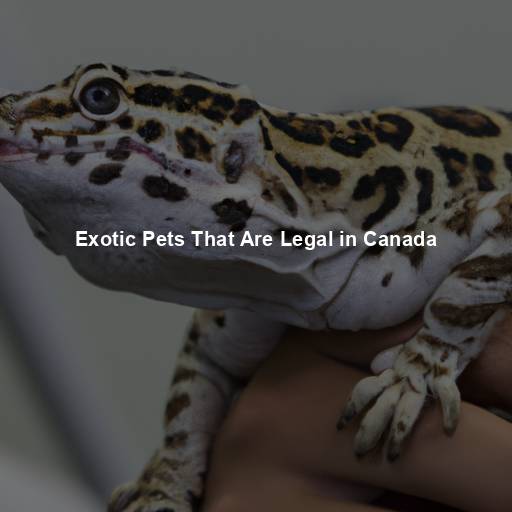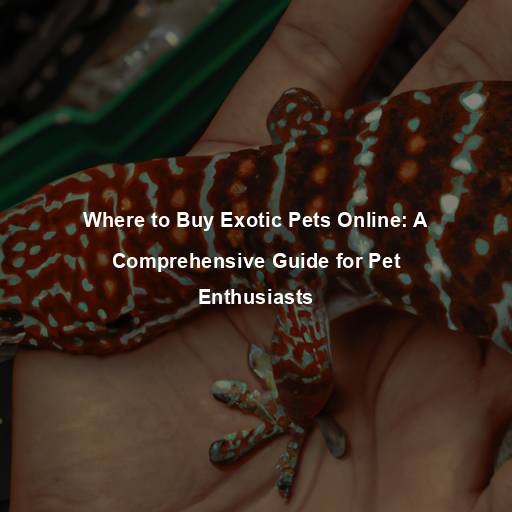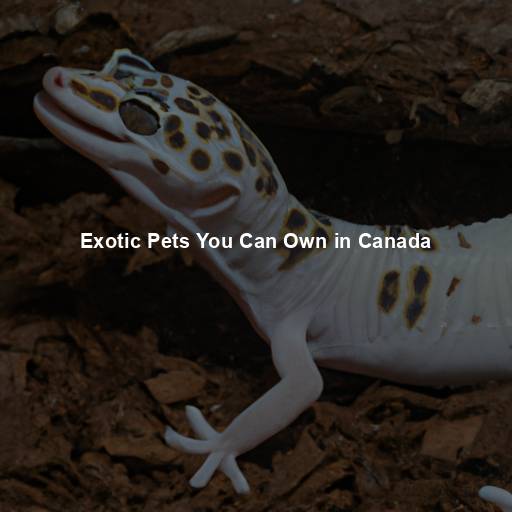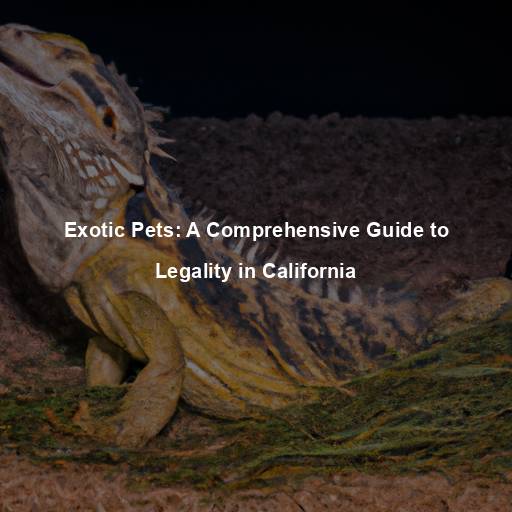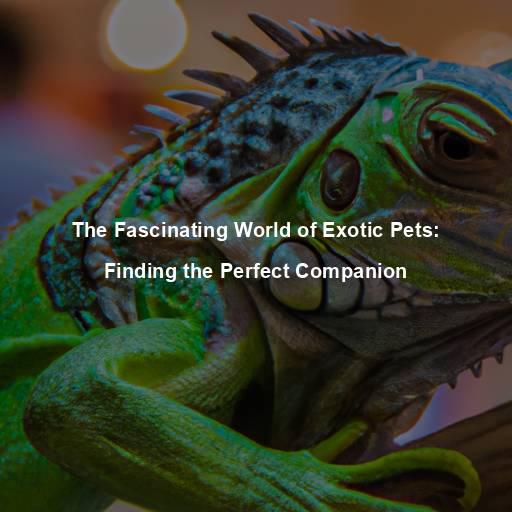Exotic Pets: A Delicate Balance Between Fascination and Responsibility
Last Updated on October 29, 2023 by Evan
Contents [hide]
The Appeal of Exotic Pets in the UK
Exotic pets have always captivated the imagination of animal lovers around the world. From the graceful beauty of tropical birds to the mysterious allure of reptiles, these unique creatures offer a glimpse into the wonders of the natural world. In the United Kingdom, the interest in exotic pets has been steadily growing over the years. However, owning an exotic pet comes with a set of challenges and responsibilities that must be carefully considered.
Understanding the Fascination
The allure of exotic pets lies in their striking appearance, intriguing behaviors, and the sense of adventure they bring into our lives. These extraordinary creatures often possess qualities that are rare or unseen in more traditional pets. For some, the appeal of owning an exotic pet stems from a desire to stand out or be different, while others are drawn to the opportunity to observe and care for animals that exist outside their native habitat.
Legal Considerations and Ethical Concerns
Thinking about bringing an exotic pet into your life? Well, buckle up and prepare for a wild ride through the world of legal restrictions and ethical concerns. In the United Kingdom, the laws surrounding these extraordinary creatures are as tight as a boa constrictor’s grip. The Dangerous Wild Animals Act 1976 lays down the law, demanding that we obtain a license for certain species that could potentially prove dangerous or harmful.
Educating the Public
One of the key challenges in the realm of exotic pet ownership is the lack of awareness and understanding among the general public. Many people are attracted to the idea of owning an exotic pet without fully comprehending the level of commitment and expertise required. It is crucial to educate potential owners about the specific needs of exotic animals, the potential risks involved, and the potential impact on their environment.
The Responsibilities of Exotic Pet Ownership
Specialized Care and Expertise
Exotic pets, by their very nature, require specialized care and expertise. Each species has unique dietary, environmental, and behavioral requirements that must be met for their well-being. From creating an appropriate habitat to providing a balanced diet, exotic pet owners must invest time, effort, and resources into ensuring their pets thrive in captivity. This often involves seeking guidance from experienced professionals such as veterinarians or exotic pet specialists.
Environmental Considerations
The impact of exotic pets on their environment is another aspect that cannot be overlooked. In some cases, the introduction of non-native species can disrupt local ecosystems and threaten native wildlife populations. The potential for these animals to escape into the wild and establish feral populations raises concerns about biodiversity and conservation efforts. Responsible exotic pet ownership involves taking measures to prevent the release or escape of these animals and supporting conservation efforts through education and awareness.
Socialization and Enrichment
Keeping exotic pets comes with its own set of challenges, as these unique creatures have intricate needs that must be met to keep them happy and healthy. From highly intelligent species to those with complex social structures, it is imperative that owners prioritize socialization and mental stimulation to ensure their well-being. This can be achieved by offering opportunities for social interaction and mental enrichment that replicate their natural habitats, such as providing suitable companionship, engaging in interactive play, and constructing stimulating environments within their enclosures.
Healthcare and Veterinary Support
Owning exotic pets comes with a whirlwind of healthcare responsibilities. These magnificent creatures often navigate baffling health challenges that demand the attention of a veterinarian versed in the ways of their untamed world. Entrusting their care to a specialist in exotic animal medicine is the key to tackling any unexpected health hurdles and ensuring proactive wellness. Routine check-ups, immunizations, and protecting against pesky parasites are all crucial components in the wild dance of preserving their overall vitality.
Ethical Considerations
When it comes to owning exotic pets, the ethical questions go deeper than just the happiness of the cute critters themselves. The entire trade, breeding, and ownership landscape is a perplexing maze of ethical conundrums that extend to the very essence of our moral compass. From the illegal trafficking of precious wildlife to the exploitation of vulnerable species, the implications are bursting with complexity. As conscientious owners, it is imperative to be aware of where our exotic pets come from and to support ethical practices that prioritize the conservation of these magnificent creatures in the wild.
The Importance of Responsible Exotic Pet Ownership
Balancing Fascination with Responsibility
While the allure of owning an exotic pet is undeniable, it is essential to strike a delicate balance between fascination and responsibility. Responsible exotic pet ownership requires a deep understanding of the needs, challenges, and ethical considerations associated with these unique creatures. By providing specialized care, supporting conservation efforts, and promoting awareness, we can ensure that the fascination of exotic pets is enjoyed in a responsible and sustainable manner.
The Role of Education and Advocacy
In the wonderful world of exotic pets, education and advocacy are the mighty duo leading the way towards responsible ownership. Armed with accurate information and a determined spirit, we can break down the walls of misconception and embrace ethical practices. Together, let’s embark on a journey of spreading awareness through educational campaigns, community events, and the vast realm of online resources. By doing so, we will pave the path towards a harmonious coexistence between humans and our extraordinary animal companions.
Understanding the Global Trade
The intricate and enigmatic world of exotic pet trade is as mesmerizing as it is bewildering. Its alluring appeal and wide-ranging nature captivate enthusiasts worldwide, sparking a intricate web that encompasses breeding, capturing, and exchanging creatures from diverse corners of the globe. While some remarkable species are meticulously nurtured in captivity to fulfill the fervent demand, others endure the tragic fate of being forcefully snatched from their natural habitats, oftentimes in illicit manners, bringing about catastrophic repercussions for the already vulnerable wild populations.
The Impact on Wild Populations
The wild is a delicate tapestry of life, a realm where exotic creatures roam freely, painting the landscape with their vibrant colors and elegant movements. Yet, beneath this mesmerizing facade lies a dark truth, a tale of reckless extraction and calamitous consequences. The insatiable demand for these captivating creatures has brought about a perilous dance with destiny, threatening their very existence.
But it is not just the populations of these magnificent beings that hang in the balance; it is the very fabric of our ecosystems that teeters on the edge of perplexity. The consequences of overharvesting are dire, with population declines looming ominously and the specter of extinction haunting their every step. It is a bewildering thought, that the pursuit of exotic beauty could inadvertently lead to its demise.
And let us not forget the method by which they are wrenched from their natural homes, a process both heart-wrenching and deadly. The capture and transport of these creatures, vibrant masterpieces of the natural world, often come at an unbearably high cost. Mortality rates soar, as if nature itself mourns the loss of these precious souls.
Thankfully, in this topsy-turvy world, there are organizations and treaties such as the Convention on International Trade in Endangered Species of Wild Fauna and Flora (CITES) that strive to stave off disaster. With regulatory prowess and an unwavering commitment to conservation, they navigate the murky waters of the international trade in endangered species, offering a glimmer of hope in our perplexing quest to coexist with nature’s wonders.
Sustainable Alternatives
As we embark on a journey towards a more sustainable future, it becomes paramount to ponder upon the perplexing dilemma of exotic pets. Conservation efforts necessitate an urgent paradigm shift, wherein we promote the adoption of sustainable alternatives. Captivity breeding programs hold the potential to satiate our appetite for certain species while alleviating the strain endured by their wild counterparts. In this endeavor, it is imperative that we prioritize the preservation of genetic diversity, upholding animal welfare, and ensuring the long-term survival of captive populations.
Exotic Pets and Human Health
Disease Transmission and Public Health Concerns
When it comes to exotic pets, there’s a whole wild world of health concerns lurking beneath their mesmerizing allure. Take reptiles and amphibians for instance – they may look fascinating, but did you know they could be carrying salmonella bacteria? Yes, the very same bacteria that can cause all sorts of trouble for both their owners and innocent bystanders. And let’s not forget about primates, those adorable creatures who could actually be harboring diseases that can jump straight to humans.
Legal and Safety Considerations
Keeping certain exotic pets can pose serious safety risks, particularly when dealing with animals that have potentially dangerous behaviors, like carnivorous beasts or venomous reptiles. Ensuring the well-being of both owners and the general public demands specialized knowledge and facilities. That’s why stringent regulations and licensing procedures are enforced to safeguard against any mishaps and preserve the welfare of both humans and animals. It’s crucial for potential owners to dive deep into research, fully grasping the legal obligations and safety dimensions that come hand in hand with owning an exotic pet.
Exotic Pets as Educational Tools
Educational Value and Conservation Awareness
Exotic pets can serve as powerful educational tools, providing opportunities to learn about different species, their habitats, and the importance of conservation. Responsible exotic pet ownership involves sharing knowledge and fostering a sense of appreciation for the natural world. By engaging with these unique animals, individuals can develop a deeper understanding of the challenges they face in the wild and become advocates for their conservation.
Educational Institutions and Conservation Organizations
Educational institutions and conservation organizations are fervently infusing exotic creatures into their programs, casting a mystifying and captivating spell on the curious minds. Zoos, wildlife rehabilitation centers, and educational outreach programs meticulously orchestrate the encounters, creating an environment that is both informative and stirring. Amidst this enchantment, a profound kinship emerges between humans and the astounding animal realm, weaving a web of empathy and an urgent call to safeguard the tapestry of biodiversity.
The Future of Exotic Pet Ownership
Balancing Conservation and Pet Ownership
As we continue to delve into the intricacies of animal welfare and conservation, it becomes increasingly evident that the landscape of exotic pet ownership is poised for transformation. Navigating the delicate equilibrium between responsible guardianship and preservation necessitates a united front, with governments, conservation organizations, and pet owners converging in a collective endeavor. This elevated approach entails reinforcing regulations with unwavering dedication, advocating for sustainable breeding initiatives, and fostering a widespread dissemination of knowledge to comprehend the distinct requisites and perplexing hurdles involved in caring for exotic animals.
Ethical Considerations and Personal Responsibility
Interested in bringing an exotic pet into your life? Well, hold your horses! Or, should I say, hold your capybaras or sugar gliders? Before diving into the exciting world of owning an exotic pet, it’s crucial to take a step back and ponder the ethical implications that come along.
FAQs – Exotic Pets UK Mammals
What is considered an exotic pet in the UK?
Discover the extraordinary realm of exotic pets in the United Kingdom, where an enchanting array of non-native mammal species dwells as beloved companions. From the captivating sugar gliders to the spiky yet endearing hedgehogs, the residents of this unique menagerie also encompass the playful ferrets, mischievous raccoons, and even certain types of primates. However, navigating the ethereal world of exotic pet ownership calls for thorough research and fortifying your knowledge about the obscure legal regulations and licensing requirements that lie in wait, ensuring a harmonious sanctuary within your own abode.
Can anyone keep an exotic pet in the UK?
Owning an exotic pet in the UK is not as simple as wearing a top hat and unleashing your inner Dr. Dolittle. There are strict regulations and licensing requirements that must be adhered to in order to ensure the safety and well-being of both the animals and the general public. While the idea of cuddling up with a lemur or taking your pet cobra for a walk may seem enticing, it’s important to do your due diligence and familiarize yourself with the legal obligations and restrictions before taking the plunge into exotic pet ownership. Remember, it’s not just about having an Instagram-worthy companion, but also about creating a harmonious and balanced environment for all involved.
Are exotic mammals legal to own as pets in the UK?
The legality of owning exotic mammals as pets in the UK varies depending on the species. While some exotic mammals are allowed to be kept as pets, many others are strictly regulated or even prohibited. The government maintains a list of species that are illegal to own without a specific license or permit. It is essential to consult with local authorities, such as Animal Welfare Departments or environmental agencies, to ensure compliance with the relevant laws and regulations.
What are the potential challenges of owning an exotic mammal as a pet?
Keeping an exotic mammal as a pet can prove to be quite a perplexing endeavor. The intricacies involved in meeting their distinct needs set them apart from conventional pets. From catering to their specialized dietary requirements and creating the perfect habitat to providing enrichment activities that cater to their unique instincts, there is a lot to navigate. Topping it off, finding a veterinarian well-versed in the care of these intriguing creatures can be a gamble. All these factors need sincere contemplation as they undoubtedly require a long-term commitment as well as a considerable financial investment.
How can I ensure the welfare of an exotic pet in the UK?
Caring for an exotic pet in the bustling United Kingdom demands a deep understanding of their needs and the commitment to provide an environment that mirrors their natural habitat. Delving into extensive research about the chosen exotic mammal species is not just advisable but essential. Ensuring regular check-ups with professionals specializing in exotic animal care should be prioritized, given the complex nature of these pets’ health. Nurturing their well-being entails providing a well-rounded diet, stimulating mental and physical activities, and promoting social interactions as part of their daily routine. More than personal desire, it is crucial to put animal welfare at the forefront and make decisions that unequivocally serve their best interests.


